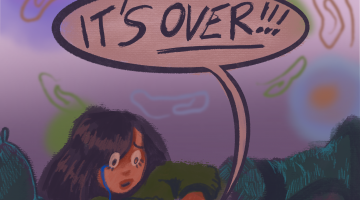
Tyler Merber / Flickr
Protestors waving Trump flags stand in front of the capitol building in Washington D.C on January 6, 2020. On this historic day, rioters stormed into the capitol building seeking to disrupt President Joe Biden’s confirmation process.
As the 46th president of the United States, Joe Biden, is sworn into office, all eyes are, of course, on his choice of White House décor. In what can be seen as an inspiring move, the portrait of Andrew Jackson in the Oval Office has been replaced by one of Franklin Delano Roosevelt. Jackson is widely regarded as one of America’s worst presidents. He signed and oversaw the Indian Removal Act, a cruel and genocidal step in the nation’s long-standing history of committing atrocities against the indigenous peoples of this land. Replacing Jackson with FDR—a widely beloved president for his New Deal policies and leadership during the second World War—is certainly a comforting signal for many.
Of course, if you drive just 5 hours south from Reno–on the edge of Death Valley–you can visit the Japanese internment camp at Manzanar. You can see where the American government under FDR forcibly sequestered the Japanese people living in the country during WWII. You can see where they were placed after having their livelihoods and possessions stripped from them. Yet, FDR is one of the “great” presidents, and is seen as a high note in American history.
A lot of wonderful, stunning, and inspiring things have occurred in American history. Even more dark, depressing, and atrocious things occurred right besides them. Quite frankly, this dark side of our nation’s history is not something very many people have come to terms with.
Throughout the end of Donald Trump’s term, many pundits and media sources have started to proclaim him as the worst president ever. They cite things such as his multiple impeachments, numerous gaffes, alleged corruption, bigoted acts and remarks, and handling of the pandemic. All of these things range from embarrassing to detestable, this is true, but they are also not unique to Trump. In many cases, Trump’s awful deeds are dwarfed by the horrors of America’s past. Twelve American presidents owned slaves. Many of our leaders aided in the destruction of this nation’s indigenous peoples. President Truman dropped two atomic bombs on civilian targets in Japan. Taken in context, the actions of Trump are just additions to a long list of tragedies.
Going beyond the sins of our leaders, America’s past is full of rarely-mentioned atrocities. The school system glosses over many of the grim moments of our recent history. The response to the AIDS epidemic, the treatment of black activists by our intelligence agencies during and after the Civil Rights movement and America’s involvement in staging coups and upholding dictatorships abroad are subjects rarely broached.
The inability of American’s to learn about, accept, and internalize the implications of the nation’s dark history hurt our country’s ability to think critically about our next steps. When unfortunate or shameful things occur, we brush them off as “unprecedented”, blips in time that are deviations from the norm. However, when it comes to American history, the unprecedented is often deeply precedented, and the abnormal is entirely normal. The Capitol Hill riots are not unprecedented when you consider the nation’s longstanding history of failing to combat right-wing insurrectionist movements. The Coronavirus response is not unprecedented when you consider how Reagan failed to respond to AIDS. We need to realize that these moments are not things that will pass by, but part of a larger pattern that has never been reckoned with. When looking back, it is okay to accept that the American past is bleak, amoral, and vile. What matters going forward is creating a better now for the future to look back on.
Vincent Rendon can be reached at vrendon@sagebrush.unr.edu or on Twitter @VinceSagebrush.










